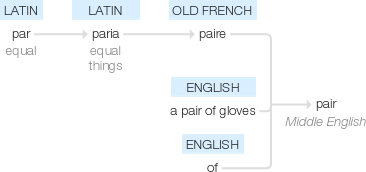Pair
Middle English: from Old French paire, from Latin paria ‘equal things’, neuter plural of par ‘equal’. Formerly phrases such as a pair of gloves were expressed without of, as in a pair gloves (compare with German ein Paar Handschuhe ).
wiktionary
From Middle English paire, from Old French paire, from Latin paria(“equals”), neuter plural of pār.
From Middle English pairen, peiren, shortened form of apeiren, empeiren, from Old French empeirier, empoirier, from Late Latin peiōrō.
etymonline
pair (n.)
mid-13c., paire, "a set of two, two of a kind coupled in use," from Old French paire "pair, couple," and directly from Medieval Latin paria "equals," neuter plural of Latin par (genitive paris) "a pair, counterpart, equal," noun use of par (adj.) "equal, equal-sized, well-matched" (see par (n.)).
Originally of things. Of persons from late 14c., "a couple, a sexual pair." Used from late 14c. with a plural noun to denote a single tool or device composed essentially of two pieces or parts (shears, tongs, spectacles, etc.). Meaning "a woman's breasts" is attested from 1922. Pair bond (v.) is first attested 1940, in reference to birds mating.
pair (v.)
"to come together with another; be mated or married" (intransitive), also "to make a pair by matching" (transitive), c. 1600, from pair (n.). These senses now often are distinguished by pair off "separate from a company in pairs or couples" (1783) for the former and pair up (1863) for the latter. Related: Paired; pairing.
